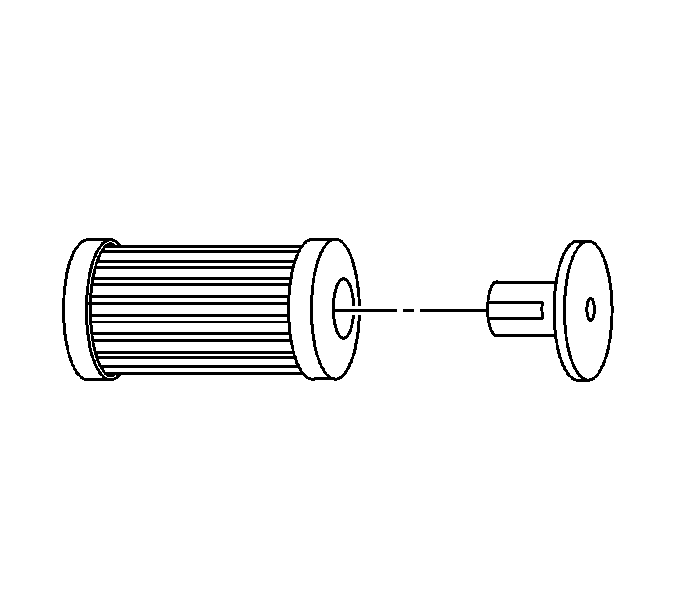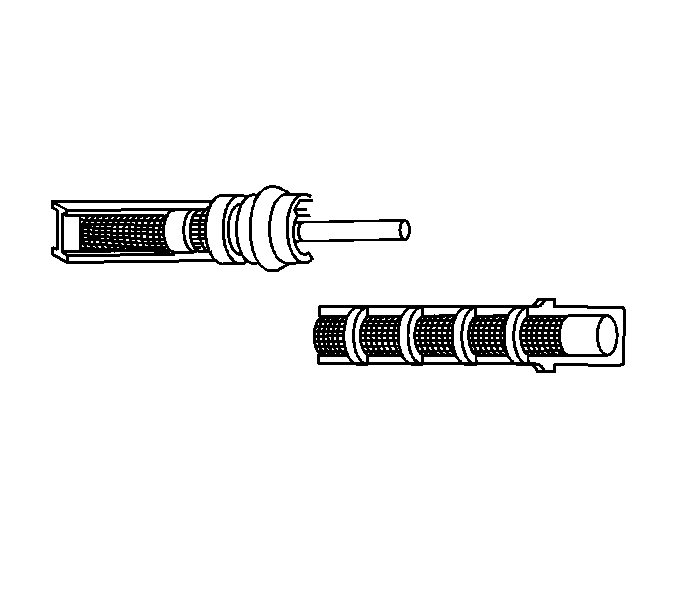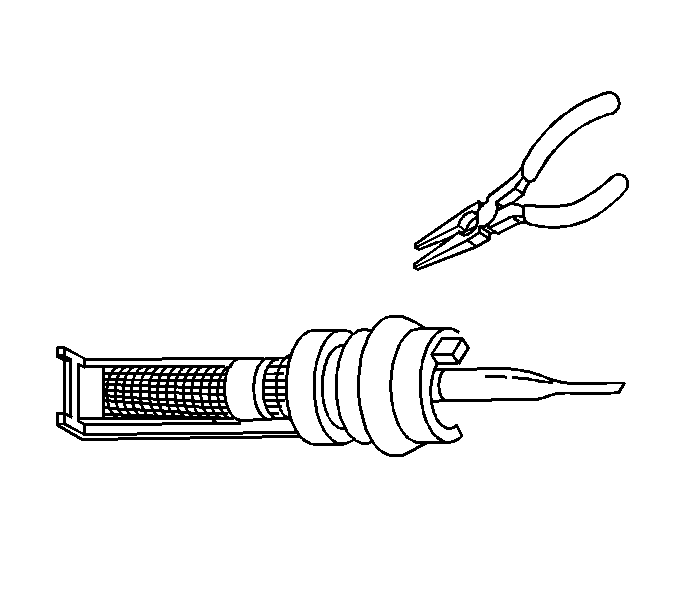Flushing Front Only System
Tools Required
| • | J 43600
ACR 2000 Air Conditioning Service Center |
| • | J 42220
Universal 12V Leak Detection Lamp |
Important: Flushing with the ACR 2000 is not intended to remove metal from the A/C system.
Flushing is intended to remove the following contaminants:
| • | Contaminated polyalkylene glycol (PAG) oil |
| • | Desiccant, following a desiccant bag failure |
| • | Refrigerant contamination |
Important: Warmer engine or ambient temperature decreases the refrigerant recovery time during the A/C flush procedure.
- Recover the refrigerant. Refer to
Refrigerant Recovery and Recharging
.
- Remove the orifice tube. Refer to
Expansion (Orifice) Tube Replacement
.
- Connect the A/C lines with the orifice tube removed.
- Remove the A/C compressor. Refer to
Air Conditioning Compressor Replacement
.
- Install J 45268-2 to the A/C compressor hose assembly.

- Forward flow refrigerant flushing is recommended for contaminated refrigerant or PAG oil.
Perform the following procedure:
| | Important: The filter inside J 45268-1 is serviceable. Remove and discard the check valve from the filter.
|
| 6.1. | Service the filter with ACDelco P/N GF 470, before each flush. |
Connect J 45268-1 to the suction port of J 45268-4 flush adapter.
| 6.2. | Connect the blue hose from
J 43600
to J 45268-1. |
| 6.3. | Connect the red hose from
J 43600
to J 45268-5. |
- Reverse flow refrigerant flushing is recommended for desiccant bag failure only. Perform the following procedure and replace the accumulator when the flush is complete:
| | Important: The filter inside J 45268-1 is serviceable. Remove and discard the check valve from the filter.
|
| 7.1. | Service the filter with ACDelco P/N GF 470, before each flush. |
| 7.2. | Connect J 45268-1 to the discharge port of J 45268-5. |
| 7.3. | Connect the blue hose from
J 43600
to J 45268-1. |
| 7.4. | Connect the red hose from
J 43600
to the suction port of J 45268-4. |
Important: Close the valve on the external refrigerant tank, before starting the flush process.
- Flush the front A/C system. Follow the instructions supplied with the
J 43600
.
- Remove J 45268-4 from the A/C compressor hose assembly.
Important: Flushing will remove all the PAG oil from the A/C system.
The A/C system must be replenished with the correct amount of PAG oil.
- If you will reinstall the removed A/C compressor, perform the following procedure:
| 10.1. | Remove the A/C compressor drain plug. |
| 10.2. | Drain the PAG oil from the A/C compressor. Rotate the compressor input shaft to assist in draining the PAG oil from the compressor. |
Notice: Refer to Fastener Notice in the Preface section.
| 10.3. | Install the A/C compressor drain plug. |
Tighten
Tighten the drain plug to 20 N·m (15 lb ft).
- If you will replace the A/C compressor after flushing the system, perform the following procedure:
| 11.2. | The service compressor is shipped with PAG oil, DO NOT drain the new PAG oil from the compressor. |
| 11.3. | Deduct the amount of PAG oil shipped with the service compressor from the amount of PAG oil listed in the capacities table. Refer to
Refrigerant System Capacities
. |
| 11.4. | Add the calculated amount to the compressor, as needed. |
Important: Flushing will remove the fluorescent leak detection dye from the A/C system.
- Add one bottle of
J 41447
directly to the A/C compressor.
- Install the A/C compressor. Refer to
Air Conditioning Compressor Replacement
.
- Inspect the orifice tube for debris. Clean or replace as needed.
- Install the orifice tube. Refer to
Expansion (Orifice) Tube Replacement
.
- Evacuate and recharge the A/C system. Refer to
Refrigerant Recovery and Recharging
.
- Leak test the fittings using
J 42220
.
Flushing Auxiliary System
Tools Required
| • | J 43600 ACR 2000
Air Conditioning Service Center |
| • | J 41459 Leak Detection
Dye Injector |
| • | J 42220 Universal
12V Leak Detection Lamp |
Important: Flushing with the ACR 2000 is not intended
to remove metal from the A/C system.
Flushing is intended to remove the following contaminants:
| • | Contaminated polyalkylene glycol (PAG) oil |
| • | Desiccant, following a desiccant bag failure |
| • | Refrigerant contamination |
Important: Warmer engine or ambient temperature decreases
the refrigerant recovery time during the A/C flush procedure.
- Recover the refrigerant. Refer to
Refrigerant Recovery and Recharging
.
- Remove the orifice tube. Refer to
Expansion (Orifice) Tube Replacement
.
- Connect the A/C lines with the orifice tube removed.
- Remove the A/C compressor. Refer to
Air Conditioning Compressor Replacement
.
- Inspect the end of the suction hose for a suction screen.
- Remove the suction screen, if installed.
- Install J 45268
-2
to the A/C compressor hose assembly.

- Forward flow refrigerant flushing is recommended
for contaminated refrigerant or PAG oil.
Perform the following procedure:
| | Important: The filter inside J 45268-1 is serviceable.
Remove and discard the check valve from the filter.
|
| 8.1. | Service the filter with ACDelco P/N GF 470, before each flush. |
Connect J 45268
-1 flush
filter to the suction port of J 45268
-2 flush adapter.
| 8.2. | Connect the blue hose from J 43600
to J 45268
-1
flush filter adapter. |
- Reverse flow refrigerant flushing is recommended for desiccant bag failure.
Perform the following procedure and replace the accumulator when the flush procedure
is complete.
| | Important: The filter inside J 45268
-1 is serviceable. Remove and discard the check
valve from the filter.
|
| 9.1. | Service the filter with ACDelco P/N GF 470, before each flush. |
| 9.2. | Connect J 45268
-1
flush filter to the discharge port of J 45268
-2 flush adapter. |
| 9.3. | Connect the blue hose from J 43600
to J 45268
-1
flush filter adapter. |
| 9.4. | Connect the red hose from J 43600
to the suction port of J 45268
-2 flush adapter. |
Important: Close the valve on the external refrigerant
tank, before starting the flush process.
- Flush the front A/C system. Follow the instructions supplied with the J 43600
.
Important: Flush the front A/C system before flushing
the auxiliary A/C system.
- If the vehicle is equipped with rear A/C, flush the auxiliary A/C system separately.

- Cut the orifice tube frame and screen, enough
to access the end of the orifice tube. Pinch off the orifice tube.

Important: Pinch off the orifice tube in order to prevent
refrigerant flow to the front system during the auxiliary system flush.
- Install the pinched orifice tube. Refer to
Expansion (Orifice) Tube Replacement
.
- Remove the auxiliary TXV. Refer to
Auxiliary Air Conditioning Evaporator Thermal Expansion Valve Replacement
.
- Install J 45268
-108.
Important: The auxiliary evaporator core can be flushed
without totally reassembling into the auxiliary HVAC module.
- Install the auxiliary evaporator core to the A/C lines.
- Raise the vehicle. Refer to
Lifting and Jacking the Vehicle
in General Information.
- Connect the auxiliary A/C lines to the auxiliary evaporator core.
- Lower the vehicle.
- Flush the auxiliary A/C system. Follow the instructions supplied with
the J 43600
.
- Raise the vehicle. Refer to
Lifting and Jacking the Vehicle
in General Information.
- Remove the auxiliary A/C lines from the auxiliary evaporator core.
- Lower the vehicle.
- Remove J 45268
-108.
- Inspect the TXV for debris.
Clean or replace as needed.
- Install the auxiliary TXV. Refer to
Auxiliary Air Conditioning Evaporator Thermal Expansion Valve Replacement
.
- Remove J 45268
-2
from the A/C compressor hose assembly.
Important: Flushing will remove all the PAG oil from
the A/C system.
The A/C system must be replenished with the correct amount
of PAG oil.
- If the removed A/C compressor is being reinstalled, perform the following procedure:
| 28.1. | Remove the A/C compressor drain plug. |
| 28.2. | Drain the PAG oil from the A/C compressor. |
Rotate the compressor
input shaft to assist in draining the PAG oil from the compressor.
| 28.3. | Install the A/C compressor drain plug. |
Tighten
Tighten the drain plug to 20 N·m (15 lb ft).
- If you replace the A/C compressor after flushing the system, perform the
following procedure:
| 29.2. | If the service compressor is shipped with PAG oil, DO NOT drain the new
PAG oil from the compressor. |
| 29.3. | Deduct the amount of PAG oil shipped with the service compressor from
the amount of PAG oil listed in the capacities table. Refer to
Refrigerant System Capacities
. |
| 29.4. | Add the calculated amount to the compressor, as needed. |
| 29.5. | If the service compressor is shipped dry, no calculation is required.
Add the total system capacity of PAG oil to the compressor. Refer to
Refrigerant System Capacities
. |
Important: Flushing will remove the fluorescent leak
detection dye from the A/C system.
- Add one bottle of J 41447
directly
to the A/C compressor.
- Install the A/C compressor. Refer to
Air Conditioning Compressor Replacement
.
- Install a new orifice tube. Refer to
Expansion (Orifice) Tube Replacement
.
- Evacuate and recharge the A/C system. Refer to
Refrigerant Recovery and Recharging
.
- Leak test the fittings using J 42220
.




